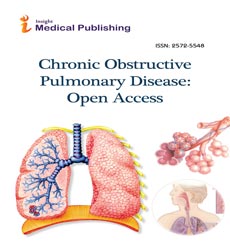Abstract
Colonization and Bronchiectasis in Patients with Advanced Chronic Obstructive Pulmonary Disease
Background: Pathogenic organisms in sputum of COPD patients are associated with increased risk of exacerbations and with a higher prevalence of bronchiectasis. This study evaluates the rate of colonization in patients with advanced COPD, along with severity of bronchiectasis.
Methods: A retrospective single-center evaluation of 378 patients with advanced COPD was performed in our pretransplant outpatient clinic between October 2008 and June 2011. Lung function, exacerbation rate in the preceding 12 months and lung and sputum microbiology were analyzed. CT scans were assessed for bronchiectasis by blinded radiologists.
Results: Sputum expectoration was reported in 196 patients (52%). Potential pathogens were identified in 77 cases (20%), Pseudomonas aeruginosa (20%) and Staphylococcus aureus (21%) were the dominant bacterials. Patients with positive sputum cultures were more likely to be hospitalized due to exacerbation (p=0.01) and demonstrated more severe bronchiectasis in standardized qualitative CT examination (p=0.002). Ninety-four patients (25%) underwent lungtransplantation during the observation period. In the explanted lungs, evidence of potential pathogen was found in 21 patients (22%).
Conclusions: Within our cohort of advanced COPD patients, almost 1 of 5 patients exhibited a positive respiratory culture. Pathogenic bacterial colonisation correlated with more severe bronchiectasis and significantly increased hospitalization due to exacerbations.
Author(s):
Hendrik Suhling, Jessica Rademacher, Sabine Dettmer, Mark Greer, Thomas Fühner, Jens Gottlieb, Felix Ringshausen, Tobias Welte
Abstract | Full-Text | PDF
Share this

Google scholar citation report
Citations : 130
Abstracted/Indexed in
- Google Scholar
- China National Knowledge Infrastructure (CNKI)
- Publons
- Geneva Foundation for Medical Education and Research
- Secret Search Engine Labs
Open Access Journals
- Aquaculture & Veterinary Science
- Chemistry & Chemical Sciences
- Clinical Sciences
- Engineering
- General Science
- Genetics & Molecular Biology
- Health Care & Nursing
- Immunology & Microbiology
- Materials Science
- Mathematics & Physics
- Medical Sciences
- Neurology & Psychiatry
- Oncology & Cancer Science
- Pharmaceutical Sciences

